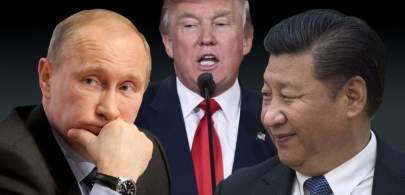Xi's Dark Vision of the Future
Thursday, June 1, 2023
Written by Alan W. Dowd, ASCF Senior Fellow
Categories: ASCF News The Dowd Report

Part one of this series discussed how Xi Jinping is infusing his regime with a brand of ethnonational racialism known as “Han supremacism.” This issue explores where such an ideology might lead China.
Expansion
The “Han supremacism” that permeates the Xi regime existed before Xi, but he has reemphasized it and revived it. And the Xi regime is promoting it beyond China’s borders.
“China’s Han-centered worldview,” the Economist notes, is becoming “a decisive force in the way it wields its growing power in the world.”
Indeed, the Xi regime has warned neighboring governments about its willingness to reach beyond international borders to protect and even unite its ethnic kin. For example, Xi’s governing vision is built around what he calls “the Chinese Dream” and aims at “fulfilling the great renaissance of the Chinese race.” Toward that end, Xi calls the absorption of democratic Taiwan an “inevitable requirement for realizing the great rejuvenation of the Chinese nation.” One of Xi’s ambassadors recently warned Malaysia (with a 25-percent Han population) that China “would not sit idly by” if the “interests of Chinese citizens” are violated. The Diplomat reports that “Kazak, Kirgiz, and Tajik already feel uneasy, if not fearful, of the increasing presence and influence of Chinese in their respective countries.”
Recall that Xi already has erased Hong Kong’s independence in blatant violation of international treaties; attacked India; threatened attacks against Taiwan; illegally claimed a vast swath of the South China Sea; built militarized islands to back up those claims; lays claim to waters and territories of Vietnam, the Philippines, and Japan; and has territorial disputes with 16 nations. Xi’s regime is interfering in the elections, political systems, and processes of other countries; unleashing swarms of fishing vessels to plunder and despoil the waters of other countries; littering space with vast debris fields that threaten commercial satellite activity; violating the airspace and territorial waters of China’s neighbors; and flouting international treaties. Not coincidentally, Xi is engaged in one of history’s largest peacetime military buildups—and will triple his nuclear arsenal in the next decade.
In all of this, there are echoes of interwar Germany.
Power
Quite unlike his predecessors in the post-Mao decades between 1976 and 2012, Xi is unbound by any term limits and unchecked by other state or party organs. Xi is now known as the PRC’s “Core Leader.”
To get a sense of what a world shaped by Xi’s China would look like, just look at Xi’s China. To hold and strengthen the reins of power, Xi has erected an Orwellian surveillance state; engaged in genocide; attacked religious minority groups; and turned entire cities into quarantine camps in a hopeless, inhuman effort to control a virus via government coercion.
Xi’s new “social-credit system” uses mega-databases to monitor and catalog every aspect of the life of China’s 1.3 billion people—financial transactions, civil infractions, social-media postings, online activity—and then reward or sanction Xi’s subjects by feeding all that information to the National Development and Reform Commission, banking system and judicial system. Subjects with good social-credit scores enjoy waived fees, lower utility bills, promotions, and expedited overseas-travel approval, while those with poor social-credit scores are fired from their jobs, expelled from school, blocked from universities, and barred from accessing transportation.
Xi has fused together the power of the state, the party, and state-owned industries into an economic behemoth—one that relies on a cyber siege of the West, pirated innovations, and legal requirements forcing entities operating inside China to share proprietary information with PRC firms, which are intertwined with the regime.
Beyond his borders, Xi bankrolls and backstops North Korea, which routinely threatens to turn Seoul into “a sea of fire,” “sink” Japan “into the sea,” and “reduce the U.S. mainland into ashes.” Pyongyang has the nukes and missiles to make that vision a reality. Xi is exporting drones to Russia for use over Ukraine, buying ever more Russian oil and gas to subsidize Putin’s war in Ukraine, and pouring nearly half-a-trillion dollars into Iran.
Labels
In short, with its coopting and control of industry, the bear-hug embrace of ethno-nationalist racialism, the elevation of the Han race above others, rapid militarization, shift toward aggressive expansionism, and targeting of ethnic and religious groups, Xi’s China has taken on many characteristics reminiscent of national socialism.
Perhaps Xi’s move from Maoism to something more closely resembling Nazism should come as no surprise. After all, the political spectrum is not a straight-line separating fascism on the far right from communism on the far left, but rather a sphere, with those two extremes sharing vast common ground on means and ends—and ultimately meeting. We glimpsed this in the means and ends of Lenin, Hitler, and Stalin. “In important respects,” as historian Paul Johnson observed of Hitler, “he remained a Leninist to the end.” Other historians have noted that Hitler and Stalin admired each other. In Xi’s China, we are being re-reminded that communist totalitarianism is very much like fascist totalitarianism.
President Truman matter-of-factly observed, “Nazi, communist, fascist or Franco or anything else—they are all alike. The police state is the police state.” He was right. We can add Xi’s monstrous regime to that list. Whatever we label it—Nazi, communist, fascist, or some grotesque hybrid of all those grotesque ideologies—Xi’s vision cannot and must not be the future of mankind.











